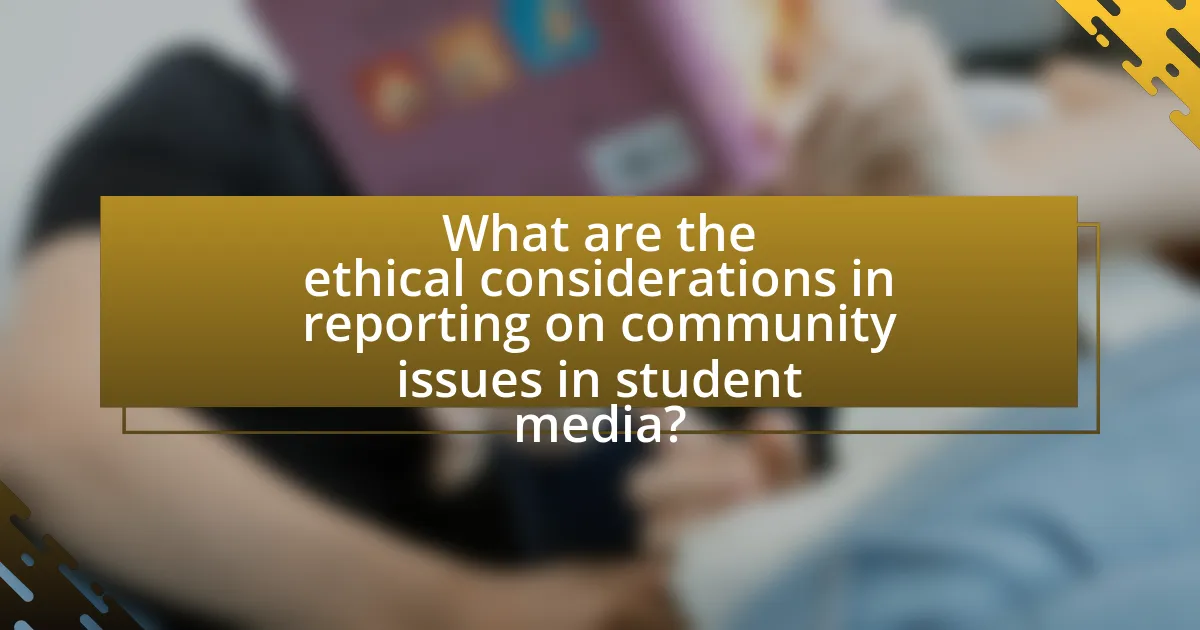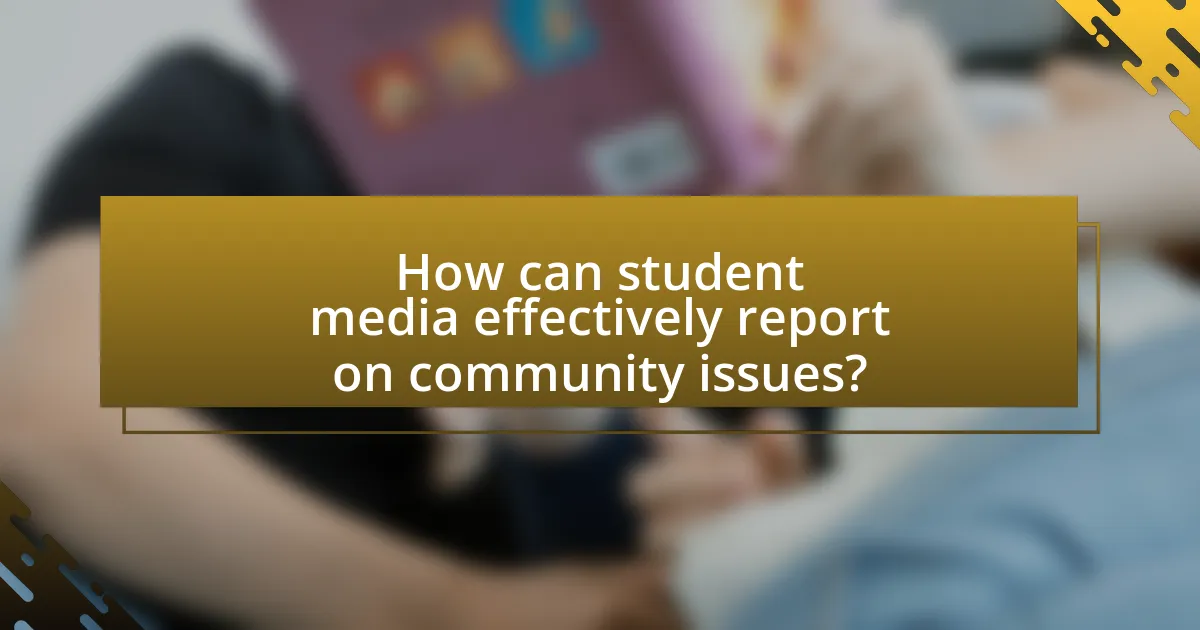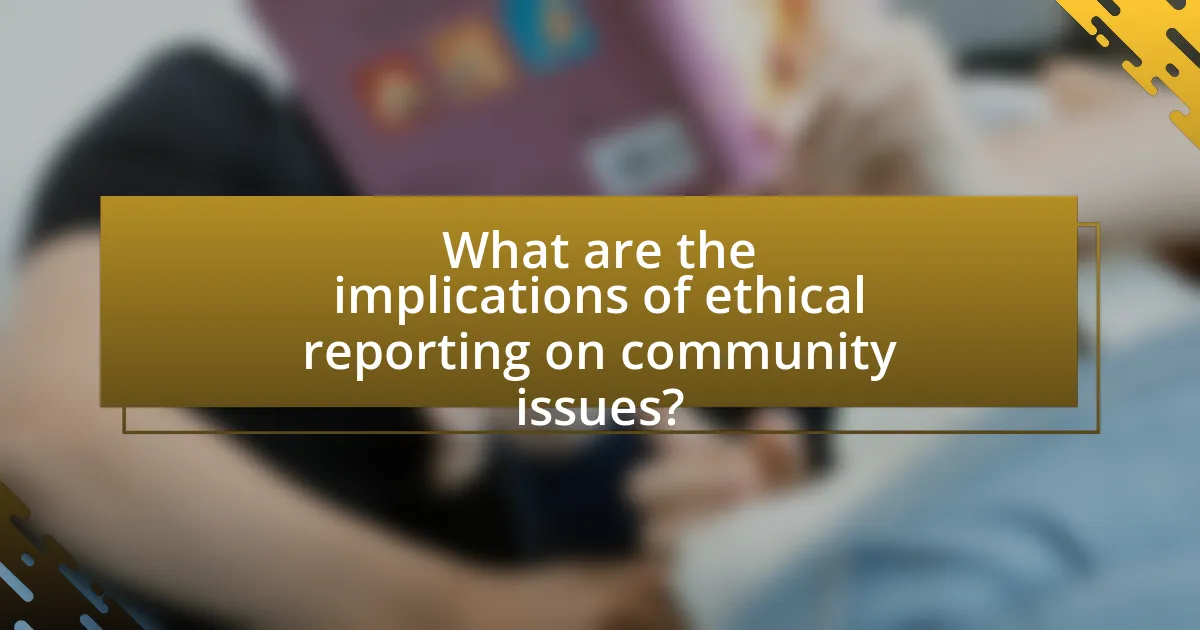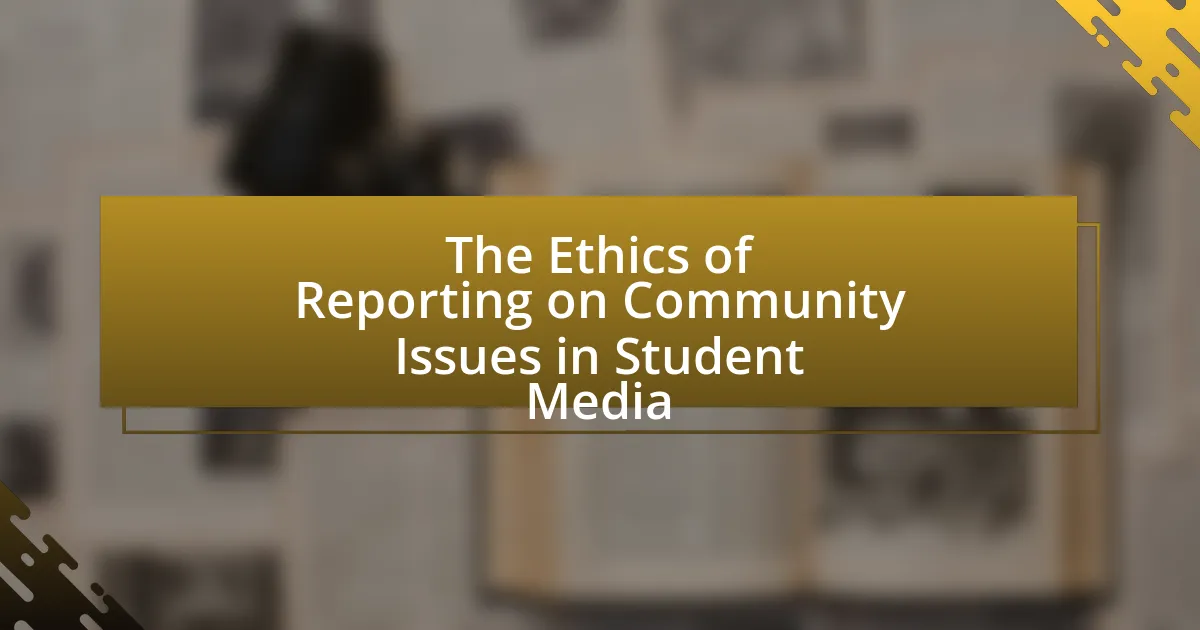The article focuses on the ethical considerations in reporting on community issues within student media. It emphasizes the importance of accuracy, fairness, and respect for privacy, highlighting how these principles foster trust and credibility between journalists and the community. Key topics include the challenges student journalists face in ethical reporting, the impact of bias, and the consequences of unethical practices. Additionally, the article outlines best practices for ethical reporting, strategies for engaging with the community, and resources available to enhance ethical journalism among student reporters.

What are the ethical considerations in reporting on community issues in student media?
Ethical considerations in reporting on community issues in student media include accuracy, fairness, and respect for privacy. Student journalists must ensure that their reporting is factually correct and represents multiple perspectives to avoid bias. Additionally, they should consider the potential impact of their stories on individuals and the community, particularly when sensitive issues are involved. For instance, reporting on mental health or crime requires careful handling to avoid stigmatization or harm to those affected. Furthermore, student media should adhere to guidelines that protect the identities of minors and vulnerable populations, ensuring that their reporting does not exploit or endanger these groups. These ethical principles are essential for maintaining credibility and trust within the community.
Why is ethics important in student media reporting?
Ethics is crucial in student media reporting because it ensures accuracy, fairness, and accountability in the dissemination of information. Ethical reporting fosters trust between the media and the community, which is essential for maintaining credibility. For instance, adherence to ethical standards helps prevent the spread of misinformation, as seen in studies showing that ethical journalism practices lead to higher public trust in media outlets. Furthermore, ethical considerations protect the rights and dignity of individuals involved in stories, promoting responsible reporting that respects privacy and avoids harm.
What ethical principles should student journalists follow?
Student journalists should follow ethical principles such as accuracy, fairness, independence, and accountability. Accuracy requires that student journalists verify information before publication to ensure the truthfulness of their reporting. Fairness involves presenting all sides of a story, allowing for diverse perspectives to be heard, which is essential in community reporting. Independence mandates that student journalists remain free from outside influences, ensuring that their work is not swayed by personal biases or external pressures. Accountability means that student journalists must take responsibility for their work, correcting errors promptly and being transparent about their processes. These principles are vital for maintaining credibility and trust within the community they serve.
How do ethical considerations impact community trust?
Ethical considerations significantly impact community trust by establishing a foundation of transparency, accountability, and respect. When media outlets adhere to ethical standards, such as accuracy and fairness, they foster a sense of reliability among community members. For instance, a study by the Pew Research Center found that 62% of Americans believe that ethical journalism enhances trust in news organizations. This trust is crucial for effective communication and engagement within communities, as it encourages individuals to rely on media for information and to participate in civic activities. Thus, ethical practices in reporting directly correlate with the level of trust communities place in their media sources.
What challenges do student journalists face in ethical reporting?
Student journalists face significant challenges in ethical reporting, primarily due to limited experience and resources. These challenges include navigating conflicts of interest, ensuring accuracy, and maintaining objectivity while reporting on sensitive community issues. For instance, student journalists may struggle with the pressure to produce compelling stories that attract readership, which can lead to ethical compromises. Additionally, they often lack access to professional training in journalism ethics, making it difficult to understand the implications of their reporting decisions. According to a study by the Student Press Law Center, 70% of student journalists reported feeling unprepared to handle ethical dilemmas, highlighting the need for better education and support in ethical journalism practices.
How can bias affect reporting on community issues?
Bias can significantly distort reporting on community issues by shaping the narrative and influencing public perception. When journalists hold personal biases, they may selectively highlight certain facts or perspectives while omitting others, leading to an incomplete or skewed portrayal of events. For instance, a study by the Pew Research Center found that media coverage often reflects the biases of the outlet, which can result in communities being misrepresented or marginalized. This misrepresentation can perpetuate stereotypes and hinder constructive dialogue within the community, ultimately affecting how issues are addressed and resolved.
What are the consequences of unethical reporting?
Unethical reporting leads to a loss of credibility for journalists and media organizations. When journalists disseminate false or misleading information, it undermines public trust and can result in misinformation spreading within the community. For instance, a study by the Pew Research Center found that 63% of Americans believe that fabricated news stories cause confusion about basic facts, highlighting the detrimental impact of unethical practices on public perception. Additionally, unethical reporting can have legal consequences, including lawsuits for defamation or invasion of privacy, which can further damage the reputation of the media outlet involved.

How can student media effectively report on community issues?
Student media can effectively report on community issues by prioritizing accuracy, engaging with diverse community voices, and adhering to ethical journalism standards. Accurate reporting ensures that information is fact-checked and reliable, which builds trust with the audience. Engaging with diverse voices allows student media to present a comprehensive view of community issues, reflecting the perspectives of various stakeholders. Adhering to ethical journalism standards, such as transparency and accountability, reinforces the credibility of the reporting. For instance, a study by the Pew Research Center found that 62% of Americans believe that local news organizations play a crucial role in informing the public about community issues, highlighting the importance of responsible reporting in fostering informed communities.
What strategies can enhance ethical reporting practices?
Implementing comprehensive training programs for student journalists can enhance ethical reporting practices. These programs should focus on ethical standards, fact-checking, and sensitivity towards community issues. Research indicates that training significantly improves journalists’ understanding of ethical dilemmas and their ability to navigate them effectively. For instance, a study by the Pew Research Center found that journalists who received formal ethics training were more likely to adhere to ethical guidelines in their reporting. Additionally, establishing clear editorial policies that emphasize accountability and transparency can further reinforce ethical practices, ensuring that student media operates with integrity and respect for the community it serves.
How can student journalists ensure accuracy in their reporting?
Student journalists can ensure accuracy in their reporting by thoroughly fact-checking all information before publication. This involves verifying sources, cross-referencing data, and consulting experts when necessary. For instance, a study by the American Press Institute found that 80% of journalists believe that fact-checking is essential for maintaining credibility. By adhering to these practices, student journalists can uphold ethical standards and provide reliable information to their communities.
What role does transparency play in ethical journalism?
Transparency is essential in ethical journalism as it fosters trust between journalists and their audience. By openly disclosing sources, methods, and potential conflicts of interest, journalists enhance their credibility and allow the public to critically evaluate the information presented. For instance, the Society of Professional Journalists emphasizes that transparency is a core principle of ethical reporting, which helps to hold journalists accountable and promotes informed public discourse. This commitment to transparency not only supports the integrity of the journalism profession but also empowers communities by ensuring they receive accurate and reliable information.
How can student media engage with the community responsibly?
Student media can engage with the community responsibly by prioritizing accuracy, transparency, and ethical considerations in their reporting. This involves verifying facts before publication, ensuring that sources are credible, and providing balanced perspectives on community issues. For instance, a study by the Pew Research Center indicates that 62% of Americans believe that accurate reporting is essential for trust in media, highlighting the importance of factual integrity. Additionally, student media should actively seek input from community members to reflect diverse viewpoints, fostering a sense of inclusivity and accountability. Engaging in community forums and collaborating with local organizations can further enhance responsible engagement, as these actions demonstrate a commitment to understanding and addressing community concerns.
What methods can be used to gather community input?
Surveys and questionnaires are effective methods to gather community input. These tools allow for the collection of quantitative data from a large number of participants, enabling researchers to analyze trends and sentiments within the community. For instance, a study by the Pew Research Center found that 68% of respondents preferred surveys as a means to express their opinions on local issues, highlighting their effectiveness in capturing community perspectives. Other methods include focus groups, which facilitate in-depth discussions among a smaller group of community members, and public forums, where individuals can voice their opinions in a structured setting. Each of these methods provides valuable insights into community needs and concerns, essential for ethical reporting in student media.
How can student media balance community interests with journalistic integrity?
Student media can balance community interests with journalistic integrity by adhering to ethical reporting standards while actively engaging with the community. This involves prioritizing transparency, fact-checking, and providing context in reporting to ensure that the community’s voice is represented accurately without compromising the truth. For instance, the Society of Professional Journalists emphasizes the importance of seeking truth and reporting it, which aligns with maintaining integrity while addressing community concerns. By fostering open dialogue with community members and stakeholders, student media can gather diverse perspectives, ensuring that coverage is both responsible and reflective of the community’s needs.

What are the implications of ethical reporting on community issues?
Ethical reporting on community issues fosters trust between media outlets and the communities they serve, leading to informed public discourse. When journalists adhere to ethical standards, they ensure accuracy, fairness, and respect for individuals’ rights, which enhances the credibility of the information disseminated. For instance, a study by the Pew Research Center found that communities with ethical journalism practices experience higher levels of public engagement and civic participation. This engagement is crucial for addressing local issues effectively, as it encourages community members to voice their concerns and collaborate on solutions. Furthermore, ethical reporting can mitigate harm by avoiding sensationalism and respecting the dignity of individuals involved in sensitive stories, thereby promoting a more constructive dialogue within the community.
How does ethical reporting influence public perception?
Ethical reporting significantly influences public perception by fostering trust and credibility in the media. When journalists adhere to ethical standards, such as accuracy, fairness, and transparency, they provide the public with reliable information, which shapes informed opinions and attitudes. For instance, a study by the Pew Research Center found that 62% of Americans believe that ethical journalism enhances their trust in news sources. This trust is crucial, as it encourages civic engagement and informed decision-making within communities. Therefore, ethical reporting not only impacts how information is received but also plays a vital role in shaping societal values and norms.
What impact does ethical journalism have on community relations?
Ethical journalism significantly enhances community relations by fostering trust and transparency between media outlets and the public. When journalists adhere to ethical standards, such as accuracy, fairness, and accountability, they provide reliable information that empowers communities to make informed decisions. For instance, a study by the Pew Research Center found that communities with high levels of trust in local news sources are more likely to engage in civic activities and support local initiatives. This trust is built through consistent ethical practices, which encourage open dialogue and collaboration between journalists and community members.
How can ethical reporting contribute to social change?
Ethical reporting can significantly contribute to social change by fostering transparency and accountability in society. When journalists adhere to ethical standards, they provide accurate and fair representations of community issues, which can mobilize public opinion and drive action. For instance, investigative reporting on social injustices has historically led to policy reforms, such as the Civil Rights Movement in the United States, where media coverage of racial discrimination galvanized public support for legislative changes. Furthermore, ethical reporting amplifies marginalized voices, ensuring that diverse perspectives are included in the narrative, which can challenge stereotypes and promote understanding. This approach not only informs the public but also encourages civic engagement, ultimately leading to meaningful social transformation.
What best practices should student journalists adopt for ethical reporting?
Student journalists should adopt transparency, accuracy, and fairness as best practices for ethical reporting. Transparency involves clearly disclosing sources and potential conflicts of interest, which builds trust with the audience. Accuracy requires thorough fact-checking and verification of information before publication, as evidenced by the Society of Professional Journalists’ Code of Ethics, which emphasizes the importance of truthfulness. Fairness entails presenting multiple viewpoints and avoiding bias, ensuring that all sides of a story are represented, which is crucial in community reporting to foster understanding and dialogue.
How can student media create guidelines for ethical reporting?
Student media can create guidelines for ethical reporting by establishing a clear framework that emphasizes accuracy, fairness, and accountability. This framework should include principles such as verifying information before publication, providing balanced perspectives, and respecting the privacy of individuals involved in stories. For instance, the Society of Professional Journalists outlines similar ethical standards, which serve as a credible reference for student media. By adopting these principles, student media can ensure responsible reporting that upholds journalistic integrity and fosters trust within the community.
What resources are available for student journalists to improve their ethical practices?
Student journalists can access various resources to enhance their ethical practices, including the Society of Professional Journalists (SPJ) Code of Ethics, which provides guidelines on ethical journalism. Additionally, the Online News Association offers training and workshops focused on ethical reporting. The Poynter Institute also provides numerous articles and courses on media ethics, emphasizing the importance of accuracy, fairness, and accountability in journalism. Furthermore, university journalism programs often include ethics courses and access to professional mentorship, which can further support ethical decision-making in reporting.
What are the key takeaways for student journalists regarding ethics in community reporting?
Student journalists should prioritize accuracy, fairness, and transparency in community reporting. Accuracy ensures that the information presented is factual and reliable, which builds trust with the audience. Fairness involves representing diverse perspectives and avoiding bias, allowing for a more comprehensive understanding of community issues. Transparency requires journalists to disclose their sources and methods, fostering accountability and credibility. These ethical principles are essential for maintaining integrity in journalism, as evidenced by the Society of Professional Journalists’ Code of Ethics, which emphasizes the importance of these values in fostering public trust and responsible reporting.

Leave a Reply